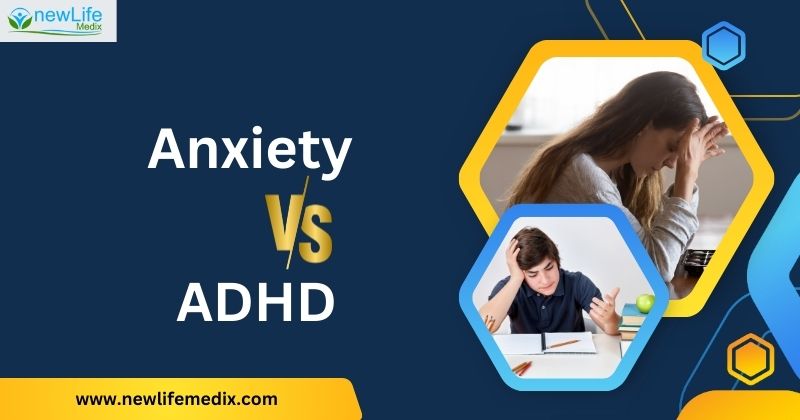Most of us might be aware of the word anxiety and ADHD. These disorders are responsible for restlessness and lack of concentration in an individual, sometimes an individual faces both disorders together. In this blog, we will try to provide you with a Anxiety vs ADHD comparison.
Anxiety is a natural feeling, but it gets converted into a problem when an individual experiences multiple episodes of anxiety
ADHD (Attention Deficit Hyperactivity Disorder) is a neurological development disorder that is liable to difficulty while paying attention, hyper-activeness, and impulsion.
So, let’s see how Anxiety and ADHD differ from each other!
Anxiety vs ADHD
What is Anxiety?
Anxiety is defined as the feeling of fear, anxiousness, and feeling of discomfort you might experience excess sweating, feeling edginess accompanied by an increased heartbeat.
In general terms, anxiety is a reflex against stress, which we have been dealing with the whole day, year, or for a large span of time.
For instance, you might face fear while tackling a difficult task or before giving any examination, etc. you feel refreshed and rejuvenated that will help you in completing the task.
But the people who have become the victim of the disorder tend to fear, which can be enormous.
What is ADHD?
ADHD is referred to as neuro-developmental disorder, this disorder can be identified in childhood and lasts into adulthood. A person suffering from ADHD may face problems in paying attention, incautious behavior and being highly active.
Symptoms: Anxiety vs ADHD
Anxiety Symptoms
As the symptoms might differ according to the type of anxiety, there are some traits that are mostly common, such as:
- Uneasiness
- Difficulty while concentrating
- Feeling tired easily
- Worrying for no reason
- Headaches
- Digestion problems
- Pain in muscles
- Problem while sleeping
Symptoms of ADHD
People suffering from ADHD may experience the symptoms based on what kind of ADHD they are suffering from.
Most commonly, the symptoms that can be observed in a patient who are troubled with the disorder are:
- Paying attention becomes difficult
- Emerged as not to be listening
- Not able to understand instructions
- Dislike work which involves mental alertness
- Lose focus easily
If somebody is facing hyperactive-impulsive presentation, then the symptoms for ADHD are as follows:
- Move restlessly
- Facing difficulty while seated
- Find it difficult to participate in an activity quietly
- Talking excessively
- Creating interruption while others are talking and have difficulty in waiting for their turn.
How can you Diagnose Anxiety and ADHD:
There are many symptoms of ADHD that may coincide with anxiety.
After multiple episodes of diagnosis, a healthcare professional can suggest the best treatment according to the diagnosis. The diagnosis might be in the form of a questionnaire or conduct an interview, they may do this with your family members to let them know about everything.
The process of diagnosing ADHD is as:
- Consideration of medical history and finding out present coping mechanisms.
- Making use of a checklist to rate ADHD indications.
- Examining whether there is any other existing problem.
- Ask an experienced person who might be a friend, family member, etc. who could help at the time of emergency.
- Ear and eye check-ups in order to consider other medications.
To test anxiety, a healthcare expert might assess symptoms and rule out any other medical issues which could lead to anxiety signs.
Usually, anxiety disorders first occur in childhood, adolescence, or early adulthood. Healthcare providers may use norms from the International Classification of Diseases and the DSM-5-TR to diagnose anxiety symptoms.
Ways to treat ADHD and Anxiety:
Treatments for ADHD include a combination of therapies and medications, which are as follows:
- Consultations, that includes relationship or family counseling.
- Cognitive Behavioral Therapy (CBT).
- Stimulant medications (Which will be discussed below)
- ADHD coaching to find specific strategies that help individuals
- Non-stimulant medications, like Strattera.
Medications to Treat Anxiety and ADHD:
There are also various medications available to treat both anxiety and ADHD. Some of common medicine are as follows-
Medicines for Treating Anxiety-
- Paxil
- Prozac
- Lexapro
- Klonopin and more…
Medicines for treating ADHD-
- Adderall
- Concerta
- Provigil
- Ritalin
- Dexedrine and more…
Can an individual have anxiety and ADHD?
According to CHADD (Children and Adults with Attention-Deficit/Hyperactivity Disorder), up to 30% of the children and 57% of adults suffering from ADHD may have an anxiety disorder,
A 2017 research suggests that up to 80% of adults with ADHD may also suffer from at least one psychic disorder.
Conclusion:
ADHD and anxiety symptoms may overlap, and having both conditions at the same time is possible. Both conditions might cause difficulty in concentrating during certain circumstances. However, anxiety may also cause symptoms like panic attacks, while ADHD can cause hyperactivity and carelessness.
Treatments and drugs, such as CBT, can be found useful in treating both the conditions. Consulting a doctor may help the patient in achieving an accurate detection and therapy that could be an aid to his/her symptoms.

